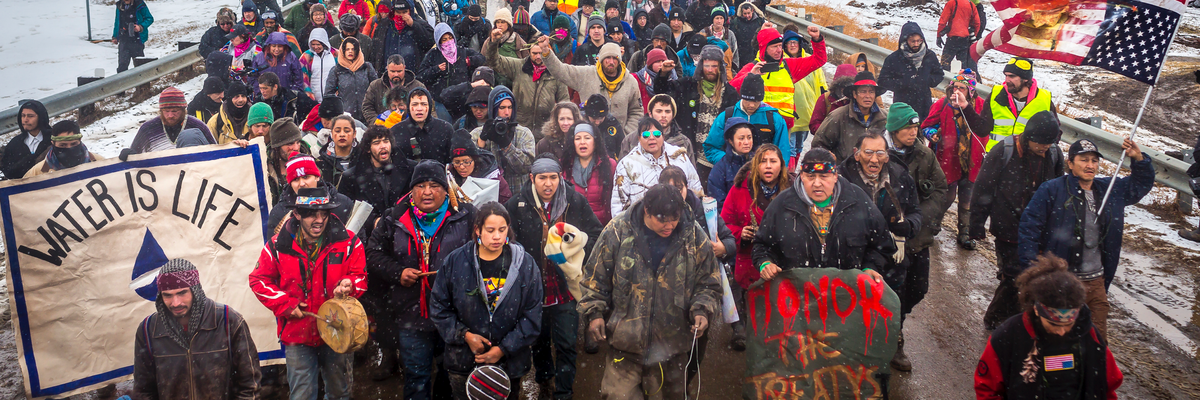Nearly 300 organizations and tens of thousands of individuals have signed an open letter supporting Greenpeace USA against a $300 million lawsuit brought against the environmental group by Energy Transfer—a company with a majority stake in the Dakota Access pipeline.
The corporation is falsely accusing Greenpeace of being the driving force behind Indigenous-led protests against the Dakota Access pipeline (DAPL) in 2016 and 2017.
Greenpeace USA announced its supporters on Thursday as it launched a campaign to raise awareness about the lawsuit—which it said could "functionally bankrupt" the organization, threatening its "existence." However, Greenpeace said that the dangers posed by strategic lawsuits against public participation (SLAPPs), like the one it faces, extend far beyond one organization.
"No matter who you are, no matter what your politics are, this is one of the most important issues in America right now," Greenpeace USA spokesperson Rolf Skar said in a statement. "Energy Transfer built the Dakota Access pipeline. But they're suing anyway in order to send a message: If you dare to oppose us, we will financially ruin you."
The Dakota Access pipeline drew massive protests from the Standing Rock Sioux Tribe, more than 300 other tribal nations, and non-Indigenous allies. While former U.S. President Donald Trump forced the pipeline through shortly after taking office in early 2017, the protests rattled the fossil fuel industry and their allies in government. After 2016, 18 states
passed anti-protest laws that shielded around 60% of U.S. oil and gas production and related infrastructure from peaceful protests. The industry also turned to "judicial harassment."
Energy Transfer (ET) initially
brought suits against Standing Rock Tribal Chairman Dave Archambault and other Water Protectors, as well as a federal suit against Greenpeace in 2017.
At the time, ET CEO Kelcy Warren told a reporter: "Could we get some monetary damages out of this thing, and probably will we? Yeah, sure. Is that my primary objective? Absolutely not. It's to send a message—you can't do this, this is unlawful, and it's not going to be tolerated in the United States."
"Everyone who says they care about freedom—of whatever political stripe—should join together to support the Greenpeace campaign to protect people's right to speak out against corporate abuses."
While the 2017 cases were all dismissed, ET immediately
filed a similar case against Greenpeace in North Dakota state court in 2019. The new case, which is scheduled to go to trial in February 2025, makes what Greenpeace called a "deeply racist" case that Greenpeace, and not Indigenous leaders, coordinated the Dakota Access protests.
"The lawsuit against Greenpeace is
also an attack on the Indigenous movement in our fight for self-determination to protect Mother Earth, our waters, sacred and cultural sites, and our youth and future generations," Morgan Brings Plenty of the Standing Rock Youth Council said in a statement. "These colonialist lawsuits are trying to send a warning to anyone who might consider speaking out and to be quiet—any of you could be next."
ET also makes several claims that would set a dangerous precedent if upheld, including denouncing legitimate speech as defamatory and making anyone who is present at a protest liable for things that occurred at the same protest.
"The whole point of this type of lawsuit is to limit freedom of expression, so even if you don't care about climate change, or you don't care about Greenpeace, you should pay attention," Skar said. "What's at stake isn't just Greenpeace or environmentalism, but the fundamental American rights to freedom of peaceful expression and advocacy for all of us."
Greenpeace has circulated a letter to ET that has so far been signed by more than 290 organizations—including 350.org, Public Citizen, ACLU North Dakota, SEIU, Indigenous Environmental Network, and Amnesty International USA—and tens of thousands of individuals, including prominent celebrities and activists like Jane Fonda, Susan Sarandon, Billie Eilish, and Adam McKay.
"This is corporate overreach that is part of a disturbing trend of attacks on advocacy and speech around the world," the letter reads. "We will not allow lawsuits like this one to stop us from advocating for a just, green, and peaceful future. On the contrary, we will ensure they have the opposite effect, increasing the support for organizations like Greenpeace and strengthening the broader movement for justice."
"This legal attack on Greenpeace is an attack on us all," the letter continues. "We will not stand idly by. We will not be bullied. We will not be divided and we will not be silenced."
Organizations also issued individual statements of support.
"Everyone who says they care about freedom—of whatever political stripe—should join together to support the Greenpeace campaign to protect people's right to speak out against corporate abuses," said Robert Weissman, co-president of Public Citizen. "As Greenpeace knows from its own experience, too often corporations use their political, economic, and legal power not just to run PR campaigns justifying their wrongdoing, but to threaten public interest advocates with bad-faith lawsuits (SLAPPs) and other intimidation tactics."
Brian Hauss, a senior staff attorney for the ACLU, said: "Protesters and advocacy groups should never have to fear the weight of groups like ETP as a condition for expressing their First Amendment rights. The court should see this lawsuit for what it is and toss it."
Progressives are also calling for a national legislative solution to the problem of SLAPP suits. While most states do have laws on the books against them, North Dakota is one of the 18 that do not.
Rep. Jamie Raskin (D-Md.) introduced the Strategic Lawsuits Against Public Participation (SLAPP) Protection Act during Congress' last session, and plans to reintroduce it in September of this year.
"The case against Greenpeace illustrates how mega-corporations can use lawsuits to silence, intimidate, and ruin their critics," Raskin said. "America must demand, and Congress must pass, bipartisan legislation to protect First Amendment rights against ruinous litigation practices."




